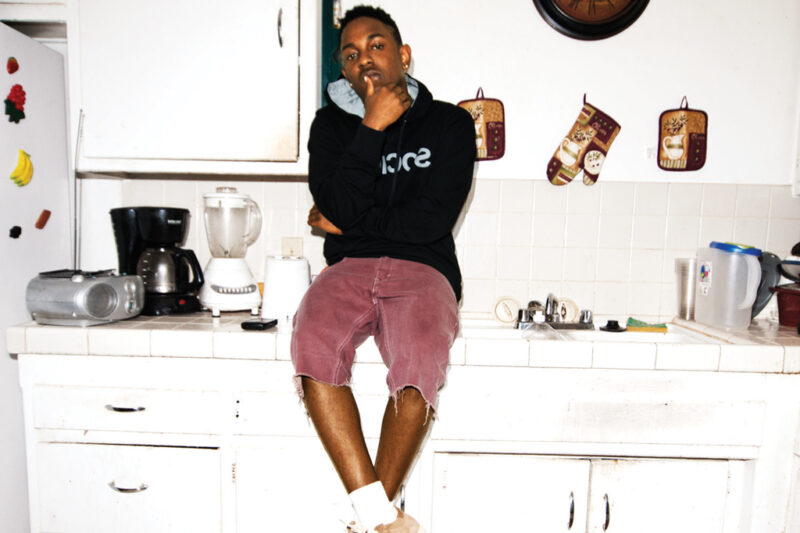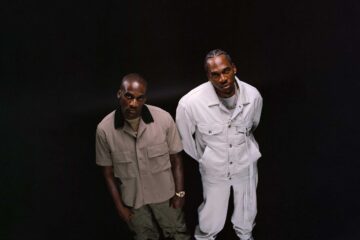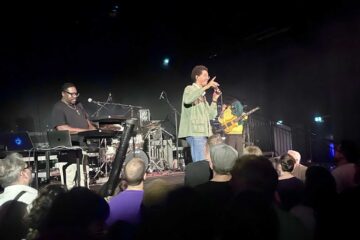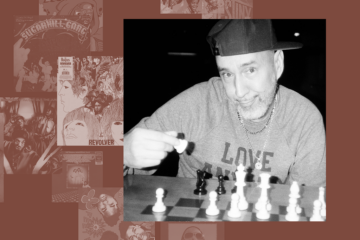Hailed as the savior of West Coast Hip Hop Kendrick Lamar’s »good kid m.A.A.d city’s« album success says something about the current state of Hip Hop. Perhaps there was an audience who was looking for something different, an audience who was missing something and perhaps Lamar catered to these rap fans. His album is an autobiographical concept album appropriately bearing the subtitle »A Short Film by Kendrick Lamar« as it tells a non-linear story of Lamar’s Compton through naturalistic skits, prayers, atmospheric beats and self-reflective lyrics. As the listener we get to hear the many voices in Lamar’s head and so all scopes from comedy to tragedy are effectively and convincingly covered creating an unparalleled view of one boy’s life in Compton – a story that is so specific to one location yet has the power to break any geographical boundaries. We talk to Lamar about the rap game, concept versus freestyle and the significance of Compton within the world of Hip Hop.
Nas once said that freestyle is bullshit. If you don’t have a concept you’re not a good rapper. Do you agree?
Kendrick Lamar: A piece of me agrees with that. I like freestyling. I like to hear people rap about whatever they are thinking about but I also like people who make albums and concept records. It’s a give and take. A little bit of both.
Is there a new honesty in Hip Hop where weakness can be expressed like on your track »The Art of Peer Pressure«?
Kendrick Lamar: I definitely feel like there is a new found honesty in Hip Hop. Hip Hop’s built from people telling their truths and expressing themselves. I’ve been doing that on my albums, continuing what the early stages of Hip Hip were doing, rappers expressing themselves from NWA to Big Daddy Kane.
All this rapping about bitches, cars and bling hasn’t disappeared but there is a lot of other stuff out there. Where do you think this is coming from?
Kendrick Lamar: I think the change comes from the people. People are tired of hearing about that stuff. There is nothing wrong with it; the early days of Hip Hop was always about boasting what you had, how good you were at rapping, how many big gold chains you had. That was Hip Hop but there comes a point in time where it needs a balance. That’s all that people ask for – this balance and hopefully I can bring that balance.
Compton is a mythical place in Hip Hop. Can you describe the cultural importance of Compton to those not so familiar with it?
Kendrick Lamar: Compton I would like to say is the birth place of gangsta rap. All the artist from Dr. Dre, NWA to Snoop were actually talking about the reality in their raps. There is a lot of gang culture with Bloods and Crips. It’s a real tricky, tricky city based on affiliations. You just got to know how to maneuver within the city. If there was one word to describe Compton it would be »unpredictable«.
Have you ever been frustrated with the state of Hip Hop?
Kendrick Lamar: Yeah, I’ve been frustrated. Not so much with the state of Hip Hop but really more with myself, trying to find my own language and niche, being able to talk about something I want to talk about and being accepted despite of that. That’s where the frustration comes from.
Was »good kid m.A.A.d city« a way to deal with frustration?
Kendrick Lamar: It definitely was. By the time my album came out I knew I’d be able to think like I had wanted to years ago before that type of music and sound was perceived as a great, honest sound. It was really about others catching up.
For your album you went back to your old neighborhood. Were you able to make sense of things you weren’t able to in 2004?
Kendrick Lamar: Yeah, definitely. I’ve been back plenty of times and being able to go back to those actual places and looking back now that I’m all the way over here – that’s a positive change. It’s a great thing to influence all the kids hanging out in the parks that I used to hang out in.
Is it weird to go back? People saying you’ve sold out or something?
Kendrick Lamar: Not in my neighborhood – I don’t get that there. Everyone still knows me as K. Dot. It’s nothing different. I’m still just a kid there.
How did the skits for your album come about?
Kendrick Lamar: Each individual skit features real people, about real situations. I brought my home boys and parents to the studio and had them reminisce in front of the microphone and took pieces from that. I didn’t want to bring in actors and make the whole thing corny. I wanted to make it sound like somebody had a hidden mic on my life the whole time.
Is the proverbial rap lifestyle all it’s cracked up to be?
Kendrick Lamar: To answer that I would probably have to wait at least another year or two to really get into the gist of the lifestyle. Right now I don’t know. I’m still regular to me.
What were you getting up to between »Section.80« and »good kid a.A.A.d city?
Kendrick Lamar: I was trying to focus, figure out what I wanted to become. Without that focus I wouldn’t be here right now. It was a real serious time, honing in on my goals and making that album was one of the goals.
DJ Quik isn’t referenced as an influence in articles written about your music though he is such an important West Coast gangsta rapper. Is this something journalists have overlooked or was he not important for your development as an artist?
Kendrick Lamar: He was definitely a reference point. He had a ton of influence on the city, made tons of money and some classic albums. Everyone just sees NWA but DJ Quik was just as big – maybe not on the mainstream level but he is a very big influence.









